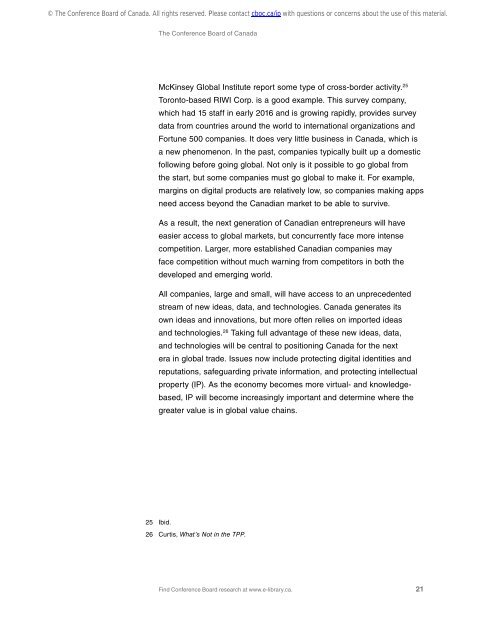Paradigm
8088-canadasnewtrade-en_rpt
8088-canadasnewtrade-en_rpt
Create successful ePaper yourself
Turn your PDF publications into a flip-book with our unique Google optimized e-Paper software.
© The Conference Board of Canada. All rights reserved. Please contact cboc.ca/ip with questions or concerns about the use of this material.<br />
The Conference Board of Canada<br />
McKinsey Global Institute report some type of cross-border activity. 25<br />
Toronto-based RIWI Corp. is a good example. This survey company,<br />
which had 15 staff in early 2016 and is growing rapidly, provides survey<br />
data from countries around the world to international organizations and<br />
Fortune 500 companies. It does very little business in Canada, which is<br />
a new phenomenon. In the past, companies typically built up a domestic<br />
following before going global. Not only is it possible to go global from<br />
the start, but some companies must go global to make it. For example,<br />
margins on digital products are relatively low, so companies making apps<br />
need access beyond the Canadian market to be able to survive.<br />
As a result, the next generation of Canadian entrepreneurs will have<br />
easier access to global markets, but concurrently face more intense<br />
competition. Larger, more established Canadian companies may<br />
face competition without much warning from competitors in both the<br />
developed and emerging world.<br />
All companies, large and small, will have access to an unprecedented<br />
stream of new ideas, data, and technologies. Canada generates its<br />
own ideas and innovations, but more often relies on imported ideas<br />
and technologies. 26 Taking full advantage of these new ideas, data,<br />
and technologies will be central to positioning Canada for the next<br />
era in global trade. Issues now include protecting digital identities and<br />
reputations, safeguarding private information, and protecting intellectual<br />
property (IP). As the economy becomes more virtual- and knowledgebased,<br />
IP will become increasingly important and determine where the<br />
greater value is in global value chains.<br />
25 Ibid.<br />
26 Curtis, What’s Not in the TPP.<br />
Find Conference Board research at www.e-library.ca.<br />
21


